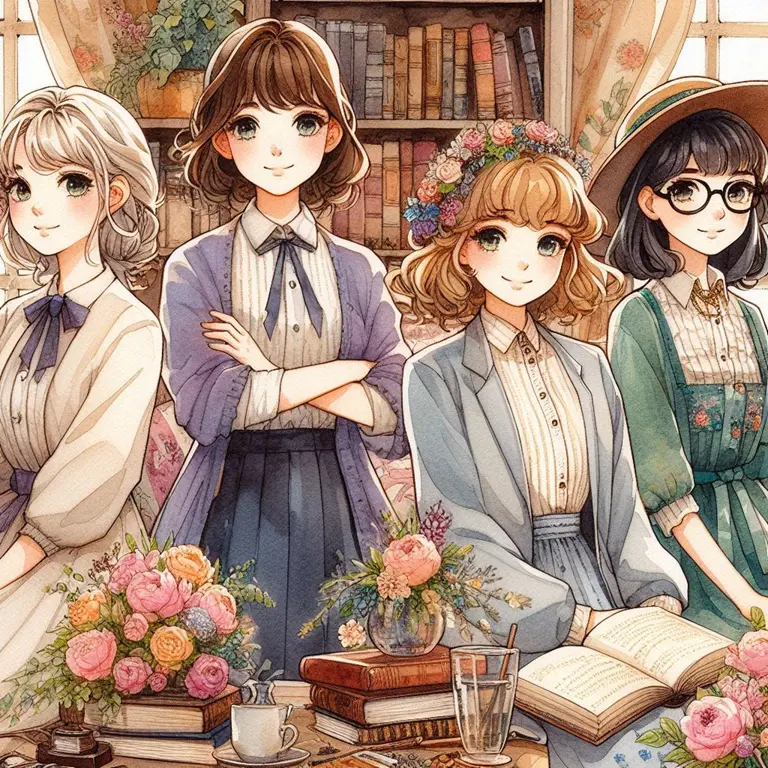Embracing the “Little” and the Fierce: Louisa May Alcott’s Ode to Ambition and Domesticity
Oh little women, how I adore thee! As a self-professed lover of all things literary and classic, I must admit I’m somewhat ashamed it took me this long to finally read the treasured novel Little Women by Louisa May Alcott. I’ve seen the movies, yes – that 1994 gem with Winona Ryder will forever hold a special place in my heart. But as we all know, the book is simply built different.
I consumed this delightful tale of the March sisters in just a few cozy evenings curled up by the fire, quickly becoming entranced by Alcott’s rich storytelling and vibrant characters. From the very first line – “Christmas won’t be Christmas without any presents,” grumbled Jo, lying on the rug – I was utterly captivated, eagerly awaiting to see how the lives of Meg, Jo, Beth and Amy would unfold.
For those unfamiliar, Little Women follows the lives and adventures of the four March sisters – Meg, Jo, Beth and Amy – as they navigate the joys and struggles of family, growing up, love, loss and pursuing their passions in 19th century New England. While the story centers around the tight-knit bond between the sisters, it’s the character of Jo that truly shines as the beating heart of the novel.
Jo March is a force to be reckoned with – fiercely independent, outspoken and with a passion for writing that burns brighter than the flames in the family’s humble hearth. From the moment she graces the pages, you can’t help but be drawn to her spirit and zest for life. Jo represents the dreams and ambitions of so many young women of that era who longed for more than the narrow confines of traditional femininity. In many ways, Jo is the living embodiment of Alcott herself. The author was no wilting flower, frequently butting heads with the societal norms and expectations thrust upon women during her lifetime.
Like Jo, Alcott had literary aspirations from a young age, avidly devouring books and writing feverishly in her journals. Her first taste of published success came at age 22 with fairy tale collections, hospital sketches and thrilling works for young audiences. But it was Little Women, semi-autobiographical in nature, that cemented Alcott’s legacy and transformed the way the world viewed the interior lives of women and girls. Through Jo’s eyes, we experience the beautiful mundanity of domestic life alongside the soaring heights of creative ambition. Alcott imbued her protagonist with the same yearning for personal and artistic freedom that she herself possessed.
Alcott’s own life was a study in embracing the entirety of the female experience, in all its complexities and contradictions. While she famously eschewed marriage for herself, describing it as “a possible menace to the freedom I value,” she took immense pride in keeping her family’s home fires burning through her prolific writing career. She was a woman who contained multitudes.
In the pages of Little Women, we witness the timeless tug-of-war between ambition and tradition that has defined the lives of countless women across generations. The novel doesn’t provide a neat, tidy solution – rather, it offers a poignant portrait of how we navigate that push-and-pull. How we carve out space for our passions and personhood within the domestic sphere.
Perhaps that’s why, over 150 years later, the story of the March sisters still resonates so profoundly. We see pieces of ourselves and our loved ones reflected back – the bookish idealist, the romantic dreamer, the caregiver, the free spirit. Alcott reminds us that there is no singular path, no flawless way to “have it all.” Instead, we must embrace the beautiful contradictions, lean into the tensions, and forge our own unique way.
With her rich inner lives and kaleidoscope of strengths and struggles, the March women remind us that to be a “little woman” is no small feat. They contain multitudes, as we all do. And like Jo, we too must fight to honor the multitudes within us – to nurture our creative flames while tending to the hearths of our hearts. So raise a glass (or curl up with a well-worn copy) to Louisa May Alcott, and the indelible mark she left on literature and womanhood.
Her words were a rallying cry for generations of little women yearning to burst through the delicate boundaries society prescribed. Through sheer force of her formidable pen, Alcott crafted an ode to the remarkable, to the unconventional, to those who dared to be utterly, unapologetically themselves.
Subscribe to our newsletter and get two free novels!



